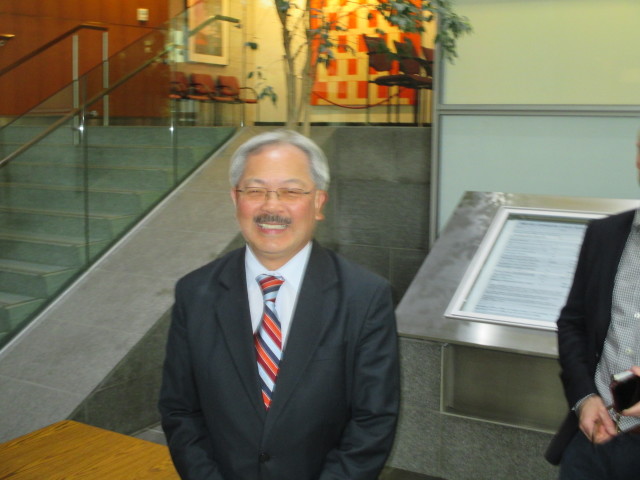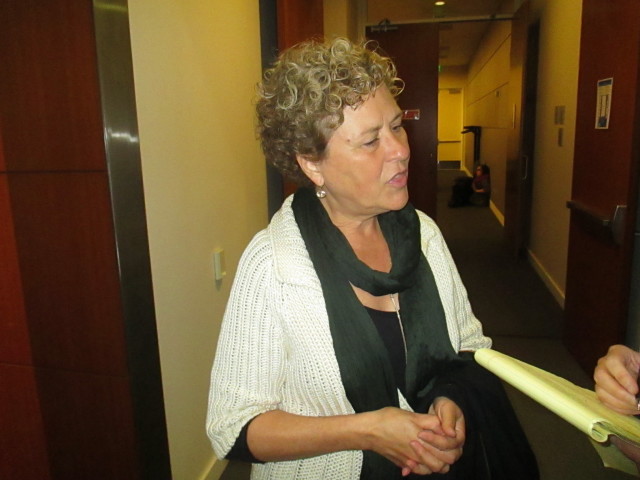Democratic County Central Committee endorses the mayor before we even know who else is running — and shoots down a modest police-reform measure

By Tim Redmond
APRIL 23, 2014 – The San Francisco Democratic Party yesterday rolled over for the allies of Mayor Ed Lee and the San Francisco police union.
It was a bit of an embarrassing spectacle, demonstrating how far to the right the party has moved in the past few years.
The Democratic County Central Committee had a resolution seeking early endorsement for Mayor Ed Lee – despite the fact that the filing deadline is still some time away and we don’t know at this point if anyone else is going to run.
As member Rafael Mandelman noted, there hasn’t been an early DCCC endorsement for any office in at least ten years – and the last one may have been for Willie Brown.

Sup. David Campos, who sits on the panel, argued that – whatever the merits of Lee’s record – the democratic process is best served if endorsing agencies wait until the filing is closed.
It’s possible that another strong contender could enter the race at the last minute; Matt Gonzalez, who nearly beat Gavin Newsom for mayor in 2003, entered the race just before the filing deadline.
In 1999, Tom Ammiano ran as a write-in candidate, after the filing deadline, and forced Willie Brown into a runoff.
And of course, there are other candidates on the November ballot, including City Attorney Dennis Herrera, who face no likely opposition, have done a good job in office, and are at least as deserving as the mayor of an early endorsement.
But Herrera wasn’t even on the agenda. It was all about Ed Lee.
Tom Hseih made the motion. Lee showed up to talk about his success in creating jobs (but didn’t talk so much about the thousands of evictions that have resulted from the tech boom). Petra DeJesus, who is a DCCC member and a Mission District resident, noted that the mayor now talks about affordability – but was nowhere when thousands of people were displaced.
And the whole thing was wired from the start: All of the elected-official members of the panel except Mark Leno voted to endorse Lee. Only Campos, DeJesus, Kelly Dwyer, and Eric Mar voted no. It was a landslide.
Before the mayor had his coronation, Dwyer had a proposal – a rather mild proposal – that the DCCC endorse the Racial Justice Committee’s call for police reform. The resolution discussed better training, independent review of police shootings, and new regulations for detaining youth and people with disabilities.
This was hardly an attack on the San Francisco Police Department – but the Police Officers Association, which opposes anything even remotely critical of the cops, didn’t even want a vote on the item.
So Hsieh argued that the proposal should be tabled because “The POA isn’t here.”
Well: The POA knew, as did the rest of us, that this item would be discussed at least 72 hours ago. But never mind – nobody wants to mess with the cops. So the notion of even voting on the measure went down, 15-8.
Sup. Julie Christensen was on the agenda for a Q and A session, which was mostly a chance for her to make a five-minute pitch for what a great job she’s doing and to field some softball questions. (Bevan Dufty actually asked her what she found the most amusing about her work so far. She said that one of her colleagues “has a mouth on her.”)
She said (echoing the mayor) that the agenda over the past few years has been “jobs, jobs, jobs” but now it’s “housing, housing, housing.” Kind of strange – didn’t anyone know that when we brought in all these tech jobs without building housing for the workers there would be a crisis?
But never mind. Mandelman asked a real question, about her position on 8 Washington, and she gave a remarkable answer, which was, in essence, that she was for 8 Washington before she was against it.
“As citizen Christensen, I initially supported it,” she said. “I thought that housing on the edge of the financial district seemed like a no-brainer. But as the project progressed, I was not supportive of the direction. I see it as a failure of design.”
I had an interesting conversation with her after the meeting, in the hall outside. I asked her whether she supported Prop. G, the anti-speculation tax, on last fall’s ballot.
Again, we got this:
“As citizen Christensen, I didn’t take a position on it.”
Now, as Supervisor Christensen, she’s seeing so many evictions in her district that “I am looking at ways to stabilize our existing housing.”
But as citizen Christensen, did she vote for Prop. G? No: “I voted against it. There were aspects that troubled me. There was some burden on the smaller property owners.”
That, of course, is nonsense, as we reported in some detail at the time.
I’m all for people growing and learning; after all, it took President Obama a while to “evolve” his stand on same-sex marriage. And Christensen told me that she is now “deeply concerned” about speculation.
But she had a chance – as a citizen, and a neighborhood activist (after all, she told the DCCC that her years of community work qualified her for the job of supervisor) to take a stand when it mattered. And she was with the landlords.






